Michael Langlois's Blog, page 11
April 2, 2012
Gaming: Table Top on Geek & Sundry
As you know, I'm a huge fan of nerding out over tabletop board games. I'm also a huge fan of both Wil Wheaton and Grant Imahara, who I like to think of as my imaginary friends. They're real, it's just our friendship that's imaginary.
No, I'm fine. I just have some dust in my eye.
Anyway, even though they refuse to stop by the house so I can crush them at Mansions of Madness, the next best thing is watching Table Top, which is a new series all about gladiatorial board gaming with your favorite geek icons.
Here's the first episode:

If you liked it, and I know you did, you can subscribe here.
Filed under: Gaming








March 27, 2012
Working in the Word Mines – Reviews

Mmph!
When you get reviews, and Cthulhu willing, you will, some of them will be bad. And not just bad, either. Mean-spirited. Dumb. Incoherent. And the worst one of all, correct.
It happens. Don't worry about it, and for the love of all that you hold dear in this world, do not reply to them.
If it's a blog post, don't comment. If it's an Amazon review, don't comment. If it's on Goodreads, don't comment. Seriously.
Consider reviews to be in ReaderSpace. You can see into ReaderSpace and learn from what goes on in there, and you should, but if you interact with it, you'll catch on fire and explode. On the internet. In front of everyone.
But bad reviews hurt my sales!
If most of them are bad, then yes. However, if I might tactfully suggest something, if most of your reviews are bad, your main problem might not be mean people on the the internet. A few bad reviews won't hurt you, and in fact, if you only have a handful of reviews and all of them are awesome, then people are going to assume those are all from your friends and family.
Go to Amazon, and check out the reviews for books you consider to be above reproach. has over a hundred 1 and 2 star reviews. Does that mean it sucks? Of course not, don't make me punch you.
But the reviewer is complaining about stuff that doesn't even happen in my book!
I feel your pain. This is actually really hard for me, because completely independent of wanting to refute a bad review, the urge to factually correct someone that your epic fantasy did not, in fact, contain any space aliens, can be overwhelming. People will read all kinds of stuff into your work, and there's nothing you can do to change that fact. Disagreeing with them will have zero effect on their convictions. Your elf space troopers will still annoy them, whether they are actually there or not.
But I agree that the reviewer found a problem and I want to thank them!
This is wonderful and a lovely sentiment. If you can thank them outside of the review area, feel free! If not, then stifle the urge. Showing up in a review area, whether as an Amazon comment to their review or in a thread on a blog, is a bad idea. It contaminates the area, for lack of a better term, and makes everything weird for your readers. As a result, you might get fewer reviews of all kinds. Or your good reviews might suddenly become suspect. If nothing else, you'll seem unprofessional.
So if I can't have my say, what can I do?
Learn from them.
Check for common complaints. For example, the number one complaint about Bad Radio is that nobody knows what the title means. It makes no difference what I have to say about it, if I keep hearing that, it's a problem. I learned, and hopefully, fixed the issue with a two sentence revision.
Look for words that indicate pacing issues, even in good reviews. Stuff like, "At first it was boring, but then wham!" are warning flags. Just because they stuck with you long enough to be entertained doesn't mean that everyone will. Make a note of it for next time.
Also, don't dismiss people complaining that it wasn't the kind of book they normally like. This isn't a case of a crackpot randomly selecting your sci-fi book and then whining that it wasn't a murder mystery, but instead a sign that your cover or blurb may be misleading.
As painful as they are, bad reviews is valuable. Don't waste them.
Just remember: "Praise is like candy. Delicious, but bad for you." – Paraphrased from every article on criticism, ever.
Filed under: Blog Posts, Writing








March 21, 2012
Here Comes Science
Fact 1: They Might Be Giants is the greatest band ever. Let us all agree on this and move on. Thank you.
Fact 2: They released Here Comes Science in 2009.
Fact 3: I am dumb, because I *just* realized fact number two. Like, in the year 2012.
But, as my loan shark is always saying, better late than never. Just in case you're not sure where this rates on the awesome scale, I present you with these:
I know, right?
Filed under: Blog Posts








March 14, 2012
Mandu is Love
Have I mentioned lately that my wife is awesome? Sure, she's hot and she puts up with me, which is in itself some kind of miracle, but more incredibly she understands my complex needs. Like, my need to cram delicious food into my face all the time.
Growing up in a Cajun/Korean household, there are a lot of dishes that I would consider comfort food. But this is one of the more difficult to pull off. Let me explain.
The crispy, golden, and delicious triangles up there are mandu, a traditional Korean dumpling. The filling is a mix of beef or pork, veggies, and spices, and is fairly time consuming to make on its own. Add to that the effort of individually wrapping each one (nearly 40 were made), and you can see how much of a labor of love that platter really is. The glass with the spoon in it contains a dipping sauce made of soy sauce, white vinegar, sesame oil, sesame seeds, and flaked red pepper. This is only substance known to man that can actually improve the taste of mandu, which is the kind of thing that used to get you burned as a witch.
In the beige bowl in the back is about a pound and a half of bulgogi, which is shaved rib-eye steak, steeped in a delightful marinade, and seared quickly in a wicked-hot pan. It's a little sweet, a little tangy, and tender as new love.
One of the best ways to eat it is to take a lettuce leaf, add some rice and gochujang (spicy fermented pepper paste), and then layer on the bulgogi. The combo of cool, crisp lettuce and hot rice and meat is incredible. It starts light and fresh, and ends with a savory, spicy, meaty bite. There's nothing like it.
Taken all together, the production of the meal you see above was a lengthy, complicated affair, which my wife decided to tackle by herself as a present for me, just because she thought it would make my day.
And it totally did. Of course, I'd count myself lucky just to be able to eat ham sandwiches with her in front of the tv, but this? This was amazing.
But not even close to as amazing as she is.
Filed under: Blog Posts








February 26, 2012
Working in the Word Mines – Characters

Jonathan Goldsmith - The Most Interesting Man in the World
Characters are the means by which you turn the potential energy of your plot and setting into the kinetic energy of story. If your work seems dull and lifeless, this is where you need to look for the problem. In the end, all we really care about is the emotion that we generate in the reader, and characters are the device that lets us do that.
By now, I'm sure you've seen about a zillion articles on creating characters. They tend to focus on the mechanical bits more than anything else, like naming and tags, and while I think those are important, they don't focus on the most critical aspect of character creation: the character's purpose.
Start with the reason for the character's existence, everything else follows that function.
Protagonist
This is the primary, sympathetic character. Note the word sympathetic, because this is key. Not always likable, which is different, but having sympathy, which means that the character and reader share some emotional tie. This bond is what allows us to induce feelings in the reader. The deeper this bond is, the more successful you will be, and success in genre fiction is generally defined as building tension throughout the book, and then giving the reader a satisfying catharsis after the climax. This is the payoff, the pleasure that rewards the reader for sticking with you throughout the book.
The protagonist is unique in that her main function is to act as a surrogate for the reader, to allow us to increase the reader's tension as a result of putting stress on her, and to release it by granting her a strong resolution to her problem. Like a Voodoo doll, whatever we do to the protagonist will have a similar resonance with the reader, provided that we can forge that sympathetic connection.
So, how do we do that? There are three key ingredients in genre fiction: affinity, vulnerability, competency.
I mentioned earlier that being likable wasn't required to build sympathy, but unless you have a very good reason for creating an unlikable main character, don't do it. One of the most effective ways to get a reader to identify with a character is simply to have them like her. Couple that with a character that the reader can relate to, either through age, gender, or social standing, and you have a solid amount of affinity going for you. This is the first, and most important, bond you will make with your reader.
Once you have that, a sense of vulnerability, either physical or emotional, will make it easier for the reader to care what happens to the character. This is generally what we mean when we say a good character has flaws. It's not so much that we want them to be realistic by not being perfect, although we do, what we really want is for them to have a weakness that we are concerned about, that could easily be the downfall of this new person we care about.
Competency tends to be more important in stories with an adventurous element, but in any story it's hard to remain sympathetic to a character that is just plain pitiful. If they frequently fall victim to their own stupidity, or struggle with things that the reader could easily deal with in real life, the reader will quickly stop wanting to share their story. Remember, part of the sympathetic bond is that the reader relates to, and is represented by, the protagonist. That said, competency should be restricted to one area. Too much competency in too many areas also makes your reader stop caring, because it kills any sense of tension in the story. The reason Superman stopped chasing bank thieves in the sixties is because it was boring. The best application of competency is to make the character admirable or impressive in the area in which they take their self identity. If your main character is a detective, she should be a good one. This also means that the primary obstacles for that character should not be investigative ones. This is why you see a lot of brilliant PI's nursing black eyes and having relationship trouble.
Antagonist
The main difference between the antagonist and the protagonist is in the ratio of affinity, vulnerability, and competency you have. Go heavy on the competency, as the protagonist will be measured by the obstacles she must overcome. Shrewdness and intellect will always be more effective here than raw power, and in fact, too much power can make your antagonist seem cartoonish. Vulnerability will help make your antagonist less one-dimensional, and can also play into her downfall. For affinity, you're looking less for likability, and more for understandable motivations. Nobody sees themselves as the bad guy. Any villain whose purpose is to be evil for the sake of evil, or what I like to call the Muhahaha Syndrome, is boring. The reasons they do the things they do should be understandable from their point of view, even if they result in some pretty awful things.
Supporting characters
Every character beyond the protagonist and antagonist will diffuse the reader's focus and can start to put a drag on the story, so make sure to use as few as possible. That said, here are few types that you'll need:
Protagonist Companions – Without these guys, you'll have very little dialogue in the book, and fewer ways to reveal information to the reader, especially with multiple point-of-view books. Also, when I say reveal information to the reader, I don't mean exposition. The characters should never announce information that they already know in order to tell the reader something. Instead, their dialogue should reveal information about their world view and opinions, or provide information based on their own deductions.
Plot Movers – These are the 'scene of the crime' characters. People that end up being interviewed or are involved with events prior to the protagonist's arrival. They are frequently used to advance the plot to the next stage, or to introduce sub-plots. Note that they don't always have to be alive to fulfill these functions.
Henchmen – Ah, yes. The lovable henchman. This means anyone acting on behalf of the antagonist, knowingly or unknowingly. If your plot involves a lot of combat, these will be the opponents before the final climax. In a crime story, this may be officers who were bribed to hinder the investigation, or even people who are simply applying social pressure to get the antagonist to quit. Use these characters sparingly, and make their interactions count. One good henchman is far more effective than a bunch of quick, shallow ones.
Mentors – The way your antagonist relates to the person who trained them, guides them, or just advises them, can give insight into their character and allow you to show the reader what drives them. This doesn't have to be some wise man on a hill, it can simply be a parent or anyone the antagonist respects. Resist the urge to kill off your mentors to create a revenge motive unless you have a very novel, interesting way to spin it. This is a particularly bad cliche' to dig up in genre fiction.
Other Tips
A few other things to keep in mind as you build your characters:
Voice – One way to keep your characters from all sounding the same is to think of a celebrity, not necessarily one that looks or acts like the character, and imagine them speaking the lines. This will allow you to hear a rhythm and make word choices that will create a unique voice among your cast.
Naming – Try to give each character a name that starts with a unique letter. This helps the reader keep them separate in an unobtrusive way. But Mike, you say in your most accusing tone, what about Abe and Anne in Bad Radio? Well, in that instance, I'm breaking the rule in order to subtly point out that there are two protagonists in the book and to create an association in the reader's mind. This kind of thing should be kept to an absolute minimum, however. You can always break a rule to get a specific effect, but you're usually better off not doing so.
Dialogue Focus – Give each character a world view that shows in their dialogue. If they're from a small town, maybe they'll talk about a murder in terms of things they think only happen in big cities. Religious characters may discuss the spiritual implications of actions before the practical, or teenagers might focus on the social impact of events before thinking about anything else.
Education levels – Vary your character's vocabulary based on their education levels and social background. People tend to speak in ways that are socially acceptable to their peer groups, so a high school student may very well be able to speak like an English professor, but wouldn't do so. Also, job specific jargon can be effective in some circumstances to build credibility, but use it sparingly.
There's a lot more to said about character creation, but if you only focus on their main purpose in connecting the reader to your story, you'll do great.
For more information on the nuts and bolts of character creation, check out Holly Lyle's excellent tutorial here, and this fantastic series of videos by Brandon Sanderson.
Filed under: Blog Posts








February 24, 2012
Zombies, RUN!
Last year a small company called Six to Start put up a Kickstarter project called ZOMBIES, RUN! Naturally it got funded, because it was super damn clever and awesome.
Proof:
You can get more info here, on the official site.
Supporters can now grab a copy of the game and start running for their lives, as I plan to do today. Everyone else can pick it up soon in the Itunes store. Hopefully the inevitable zombie apocalypse happens AFTER it becomes generally available, so that you can be properly trained.
If not, I'll be sure to loot your body when I pass it.
Filed under: Blog Posts








February 21, 2012
The Joy of Tiny Plastic Fribbits
As you may have noticed, I like to gather my "friends" for the occasional table top game. And while I mostly play the games the way them come right out of the box, I'm afraid that a combination of peer pressure and marketing has collapsed my usual aversion to buying extra bits and pieces.
I know, *gasp*.
First of all, my Super Dungeon Explore minis are nearly complete, thanks to Jason, my favorite painter of tiny things. He painted about a million of these:
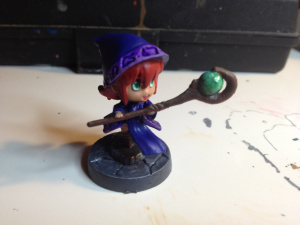
I may be tiny, but I can still set you on fire.
So, I decided to protect all his hard work with this:
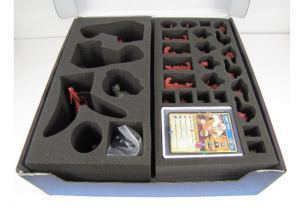
Battle Foam!
It's basically a kit that contains several inserts to hold all of the game pieces and minis, and the whole thing fits into the original box. Super clever.
Then tragedy struck, and before I knew it, I had watched this video while my willpower was still at a low ebb:

Once the video ended, I noticed that there was nobody around to slap the mouse out of my hand, so I went here and ordered these for Arkham Horror:

Seriously, what was I supposed to do? THEY HAVE TENTACLES. Like anyone could resist that. Christ, they might as well be constructed entirely out of supermodels and salty caramel. I also bought a bag of tiny magnifying glass tokens that I can use for all my various AH themed games. Which are numerous and in desperate need of more tiny plastic bits.
So anyway, now I'm happy. I got everything that the internet told me to buy, and just in time, since now my wife is home and watching me suspiciously, ready to tackle me if it looks like I'm about to click on any online game stores.
All I can say is too late, baby. Too late.
Filed under: Blog Posts, Gaming








February 14, 2012
Walker Hits the Top 10

Typing Guy seems excited. How nice for him.
This is actually the second day of top ten excitement. Walker is on three Amazon bestseller lists at the moment, one of which is pretty large, Fiction/Action&Adventure. So that's pretty cool.
Not much has changed, of course. I did a little dance, and then went back to work in the word mines. Glamorous, I know!
Thanks to everyone who sent me notes of congratulations, and even more thanks to everyone who took a chance on a new author this week.
Much appreciated, folks.
Filed under: Blog Posts








February 13, 2012
Walker Proof In the House
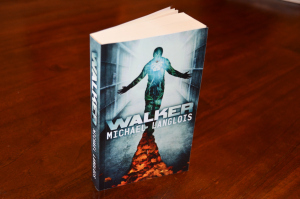
Mmm, paperlicious!
Got the proof copy of Walker today, and I may have rubbed it all over my body. You don't know, you didn't see me.
Other, non-rubbed-on copies will be for sale shortly, so keep an eye out.
Also, stop judging me!
Filed under: Blog Posts








February 12, 2012
Gaming Weekend: All Hail Cthulhu!
Got in lots of Lovecraftian gaming this weekend:
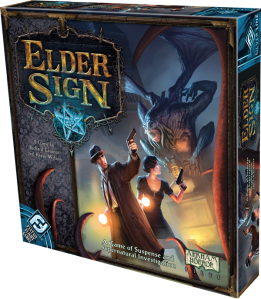
Elder Sign
and
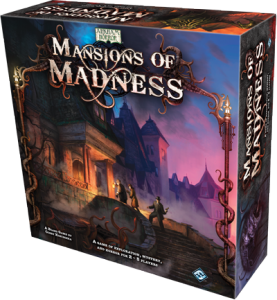
Mansions of Madness
Both were huge fun, with Elder Sign being the quicker, more lightweight game, and Mansions being the large, total tabletop experience. In both cases, a team of investigators are attempting to stop an Elder God from devouring everyone, but with Elder Sign, all the players are working together against the board.
In Mansions, one player (the most handsome and clever one) is the Keeper, and is actively trying to stop the other players (nosy busybodies), who are the investigators trying to save the world. For some reason.
Here's a shot of the brave gibbering horrors trying to stand up to the homewrecking jerks:
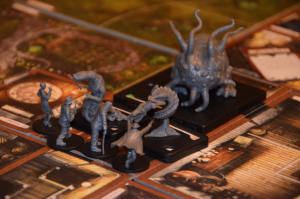
Can't we just hug and accept that we're different?
All in all, it was fantastic day of trying to end the world.
My only regret is that my 'friends' Cory and Erik managed to stop me. THIS TIME.
Filed under: Blog Posts, Gaming












